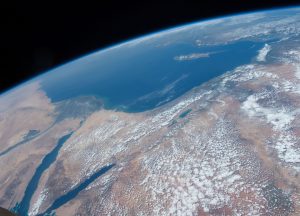
It has been a busy few weeks in the Middle Eastern satellite and space sector, with developments and activities taking place from Morocco to Iran, and all points in between. The following is a roundup of the regional space and satellite news that was not previously covered in-depth by SpaceWatch.MiddleEast.
Iran
The head of the Iran Space Agency (ISA), Morteza Barari, announced on 14 November 2018 that the Iranian government is to encourage more private sector involvement in the country’s space programme and in the provision of satellite services by asking the private sector to invest in Iranian space applications. “We are seeking to break the government’s monopoly of the space sector and open up the field for the private sector,” said Barari. Additionally, Barari also said that the ISA intends to establish four space tourism parks around Iran. “Our agency has several plans to attract more space tourists by drawing on the resemblance between Iran’s geographical attractions and the solar system,” Barari added.
Iran had previously announced on 4 November 2018 its intention to use high-altitude balloons to carry communications payloads in Iranian airspace in order to provide sovereign communications capabilities across the country, especially during emergency situations such as natural disasters.
Israel
Satellite communications equipment manufacturer Gilat announced on 14 November 2018 that its dual-band aero terminal has passed the standard for the environmental testing of avionics hardware and received the DO-160 certification. Gilat’s Ku/Ka AeroEdge 6000, a complete aero terminal, is now ready to install in all commercial aircraft, providing opportunities to HTS operators, IFEC service providers and airlines who want to leverage IFC opportunities with the flexibility to use both the Ku- or Ka-bands.
SpaceIL, the Israeli non-profit organisation set to launch a lunar lander to the Moon in early 2019 (and in turn make Israel the fourth country to go to the Moon), revealed on 19 November 2018 that Canadian billionaire Sylvan Adams has joined the project and has contributed U.S.$5 million to SpaceIL. “This contribution to strengthening the Israeli space program, and encouraging education for excellence and innovation among the younger generation in Israel, is the best gift I could have asked for…I believe that sending the first Israeli spacecraft to the moon will inspire Israeli school children to take up STEM [science, technology, engineering and mathematics] studies and think about space exploration, and especially to believe that everything is possible,” said Adams, quoted in The Jerusalem Post.
Jordan
JY1-Sat, the first Jordanian-built satellite, is due to be launched on board a SpaceX Falcon 9 space launch vehicle in the coming days. JY1-Sat is Jordan’s first 1U CubeSat mission and was developed by a multidisciplinary team of engineering students from a number of Jordanian universities. The students built JY1-SAT and will operate it from a dedicated ground station in Jordan. The Royal Jordanian Radio Amateur Society (RJRAS) is a key partner in the project, and has contributed the necessary HAM Radio expertise and equipment in support of the mission. JY1-Sat will carry a 435/145 MHz amateur radio linear transponder and a Slow-Scan Digital Video (SSDV) system to transmit stored images.
Morocco
The Mohammed VI-B high-resolution Earth observation satellite was successfully launched on 20 November 2018 on board an Arianespace Vega satellite launch vehicle into a sun-synchronous orbit. The satellite, manufactured by French satellite manufacturers Airbus Defence and Space (satellite bus) and Thales Alenia Space (imaging payload), joins its twin Mohammed VI-A that was launched almost a year ago. Mohammed VI-B is expected to start operations as soon as on-orbit checks and imager calibration have been completed.
Saudi Arabia
Saudi satellite company Shammas announced on 4 November 2018 that it will fund the first privately owned satellite in Saudi Arabia called BadrSat. Meflah AlHaftaa, Chairman of the Board of Directors of BadrSat, confirmed that attractive offers will be available for satellite channels that opt to move to BadrSat, including the availability of services for customers in Saudi Arabia through its Shammas media city.
Arabsat held its 163rd Board of Directors meeting in Amman, Jordan, on 9-10 November 2018, under the chairmanship of Dr. Nasser Al-Hujailan, Saudi Deputy Minister of Culture and Information.
Arabsat also participated in the AfricaCom conference held in Cape Town, South Africa, on 13-15 November 2018, where, according to its President and CEO Khaled Balkheyour, Arabsat’s “participation in this show is the culmination of Arabsat’s recent great achievements, as now our satellites are covering the entire African continent providing TV, telecommunications, and Internet satellite services. Also, Arabsat has established a dedicated business unit to meet all the needs of Africa. Arabsat will also showcase the capabilities of its state-of-the-art satellites, covering the entire African continent with full in-orbit back up.”
Arabsat and Algerian telecommunications provider Divona partnered to provide high-speed satellite broadband services for the fourth edition of the SAHARI International Challenge Rally held in the Sahara Desert in Algeria on 1-8 November 2018. The rally took place over a distance of 3,300 km, including 2,100 tracks and dunes, and involved 127 competitors from around the world.
On 14 November 2018, Arabsat and RigNet Inc. signed an agreement for the latter company to provide comprehensive cyber security and data protection services across the Arabsat network in order to mitigate eavesdropping on satellite links and data breaches. Arabsat will begin offering RigNet’s CyphreLink to provide military-grade encryption for location to location communications over satellite and terrestrial networks. CyphreLink™ is an innovative cybersecurity service that provides full data protection with virtually no impact on network latency or performance over satellite or terrestrial networks. The hardware-based encryption enables military-grade data security, with little to no overhead on the payload. CyphreLink prevents eavesdropping and potential data breaches.
Arabsat also announced that it shall be participating in the Cairo International Telecommunications and Information Technology Conference & Exhibition, also known as Cairo ICT 2018, that will be held from 25-28 November 2018, in the Egypt International Exhibition Center in New Cairo. Khalid Balkheyour said that Arabsat’s “participation in the Cairo ICT this year is to showcase Arabsat’s new satellite capabilities that were designed with state-of-the-art broadcasting technologies covering the whole of Africa.”
UON, the inflight connectivity service for Saudia Airlines, was inaugurated on 15 November 2018 on board a Riyadh to Geneva flight. UON utilises dual Ka- and Ku-band technology built by Saudi Arabia’s Taqnia Space in partnership with Eutelsat, Japanese aerospace designer Jamco, U.S. satellite technology company Idirect, and content providers Axinom and SITAONAIR.
United Arab Emirates
MYSAT-1, a CubeSat built by students at the UAE’s Khalifa University, was successfully sent to the International Space Station (ISS) on 17 November 2018 on board an NG Antares-230 launch vehicle from the NASA Wallops Island Facility – the Mid-Atlantic Regional Spaceport (MARS) – in Virginia, United States. MYSAT-1 will be subsequently placed in low-Earth orbit from the ISS.
 SpaceWatch.Global An independent perspective on space
SpaceWatch.Global An independent perspective on space




